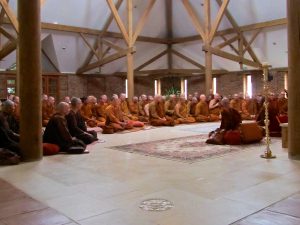Teaching Dharma, Grooming Sangha: The Buddhist College of Singapore
May 16, 2022

Assistant Professor Jack Meng Tat Chia (NUS Department of History) provides historical context to modern Buddhism in Singapore and a focused look at the Buddhist College of Singapore (BCS) in ‘Teaching Dharma, Grooming Sangha: The Buddhist College of Singapore’ (Journal of Social Issues in Southeast Asia, 2009).
‘Reformist Buddhism’, a direct analogue of the Protestant movement within Christianity, started arriving in Singapore in the 1960s and promoted a highly syncretic (merged or fused) religious identity within the Singaporean Chinese community, where statistics show 65% of Chinese-Singaporeans consider themselves nominally Buddhist. This Singaporean form of Buddhism, however, had no indigenous pastoral support network – with there being no formal monastic schools to train Sangha members. Consequently, those seeking a Buddhist education had to travel further afield to places such as Taiwan, Thailand, or Sri Lanka until the 1990s.
Although the first ever Buddhist college to be established in Singapore, in 1994, was the Buddhist and Pali College of Singapore (BPCS), A/P Chia differentiates the earlier institution from the newer BCS through their differing visions of Buddhist education. The BCS specialises in Chinese Mahayana versus the BPCS’s Theravada focus, and the BCS accepts only Sangha members as its students versus the BPCS’s more wide-reaching acceptance of either Sangha members or laity.
The article goes on to explain the four primary objectives of the BCS at its foundation in 2009:
(1) To develop talents in monastery and temple management.
(2) To train teachers for Buddhist colleges.
(3) To foster researchers in Buddhist Studies.
(4) To nurture Dharma propagators.
The future challenges faced by the BCS are analysed by A/P Chia as ones of regulation and popularity. As an approved religious college, the BCS must abide by MOE rules and procedures which may over time conflict with the college’s ethos or beliefs. And as a relatively new Buddhist college, the BCS faces a significant challenge in attracting students, being located relatively closely to more well-known international Buddhist colleges and universities.
Read the full article here.
